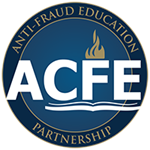
Anti-Fraud Education Partnership
Many Association of Certified Fraud Examiner (ACFE) members around the world first discovered their passions for fraud detection and prevention in a course at a college or university. For some, their interests were piqued while reading about a past case or working on a mock investigation.
In an effort to offer more formal education to the students who look to you and your program for anti-fraud knowledge, we created the Anti-Fraud Education Partnership (AFEP) nearly 20 years ago.
Why You Should Join
Join the nearly 300 colleges and universities participating and preparing students for this growing field by becoming a member of the Anti-Fraud Education Partnership. There is no fee and joining is easy.
As a partner, you have complimentary access to:
- Case studies
- Videos featuring convicted fraudsters
- Sample syllabus for a Principles of Fraud Examination course, PowerPoint presentations and test bank questions from Wiley
- Digital copy of the Fraud Examiners Manual
- Guest lecturers – The ACFE assists in locating practitioners to guest lecture.
- Use of the Anti-Fraud Education Partnership logo on your institution's website
- Recognition for your college or university on the ACFE website as a fraud education provider
Since fraud has become one of the most costly crimes of the 21st century, it’s more important than ever that we protect our accounting graduates with the armor of fraud examination education.Dr. Joseph T. Wells, CFE, CPA
Occupation:
ACFE Founder and Chairman
Industry:
Education
Location:
Austin, Texas, U.S.
How to Join
- Determine eligibility. To join the partnership, you must commit to implementing a 3-credit hour undergraduate or graduate level course on fraud examination or a related subject. The partnership is only available to 4-year colleges and universities. Institutions with existing fraud examination courses qualify to join. If you are a community college, please email us at HigherEd@ACFE.com.
- Submit a Resource Request Form and Terms of Use.
- Submit a Letter of Intent.
The letter of intent must be composed on university letterhead and may be authored by the dean, department chair or instructor teaching the course. The letter of intent must include the following information:
- A statement of your intention to begin a three-credit hour course on fraud examination or a related subject
- Instructor who will teach the course (must be a member of the ACFE)
- Course number as listed on your university’s website or course catalog
- Course level (undergraduate, graduate or other)
- Credit hours
- Date in which the course will be implemented
- Link to your course description hosted on your university’s website or course catalogue (if currently active)
- Course delivery method (campus, online or hybrid)


